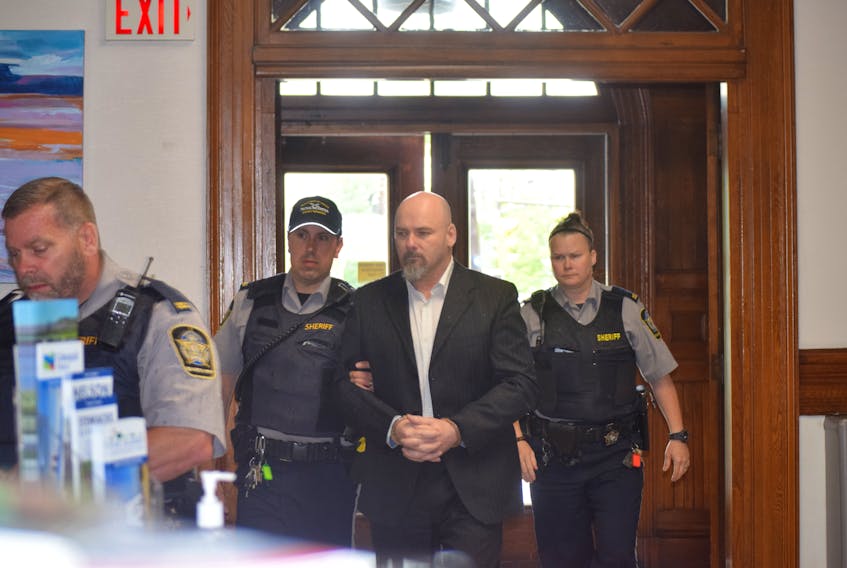TRURO, N.S. — A Bayhead man is to be sentenced for second-degree murder on Sept. 16 after changing his plea to guilty in the shooting death of his neighbour Susan Butlin.
Ernie Ross (Junior) Duggan, 51, entered the plea in Nova Scotia Supreme Court in Truro on Friday.
“Yes, it is,” Duggan quietly confirmed, to Justice Jeffery Hunt, after the intent to change his plea was announced by his defence team. Duggan was originally charged with first-degree murder.
Butlin, 58, died in her Clarks Road home late on the night of Sept. 17, 2017 after being struck in the face at close range from “a single shot from a shotgun”, at the hands of an intoxicated Duggan, according to a statement of facts provided to the court by co-Crown attorneys Peter Craig and Perry Borden.
“Between 11:40 p.m. and 11:50 p.m. he retrieved the shotgun and walked over to Ms. Butlin’s residence,” the statement says. “He knocked on the window of her front door and called out to Ms. Butlin, asking if she was angry.
“When Ms. Butlin came to the door, he fired one shot from the shotgun through the window of the door at an upward angle. Despite his alcohol consumption, the Accused knew that firing the shotgun in that direction would either kill Ms. Butlin or cause her bodily harm that was likely to cause her death and he was reckless as to whether her death ensued.”
After firing the shot, Duggan walked into the residence and saw Butlin’s body laying on the floor.
“He then quickly left the Butlin home, leaving his bloody footprints on the exterior steps, and returned to his home. He gathered his firearms and ammunition and the remnants of his pint of rum and drove away in his truck.”
The night’s events followed a period dating back to July 2, 2017 when Duggan had visited Butlin’s residence after an evening of heavy drinking at both his home and later at Butlin’s.
On July, 8, Butlin disclosed to Duggan’s wife that he had been “sexually inappropriate” with her on July 2.
“She demanded that he acknowledge his behaviour and apologize to her, and indicated that she would go to the police and lay a formal complaint if he refused to apologize,” the statement said. “The Accused’s wife informed him that she was leaving him and that she would be pursuing a marital separation.”
Butlin subsequently filed a Peace Bond Application against Duggan, which was heard in provincial court on August 30, 2017.
The statement said the presiding judge expressed concern that the accused’s conduct detailed in the application constituted a criminal offence and the hearing was adjourned to allow the RCMP to further investigate the allegations.
“Neither the prosecutors nor the Judge were aware at the time that the police had already investigated the matter and had determined there were no grounds to lay criminal charges,” the statement said.
The adjournment of the hearing “coupled with the belief that he would again be investigated for the sexual assault” became a “source of considerable anxiety” for Duggan, the statement said, and over the course of the next few weeks his drinking, drug use (including cocaine) and depression increased.
On Sept. 14, 2017, the RCMP reviewed Butlin’s complaint and again concluded there were no grounds for laying criminal charges against Duggan, although he was “not immediately” advised of that outcome.
Prior to that, on Aug. 21, 2017, the statement said, that Duggan had arrived home with two firearms, a 12-guage shotgun and a high-power .308 calibre rifle, along with a bag full of ammunition for both guns. He told his wife that he had found the firearms, which turned out to have been recently stolen by someone else from a residence in the community.
The same night, Duggan’s wife had become increasingly concerned with his drinking and behaviour, including threats that “Butlin was ruining his life and she would have to die.”
His wife later called 911 about the threat and locked Duggan out of the house. Shortly afterwards, he kicked in the door to his residence, at which point his wife and a friend took off and drove away.
When RCMP officers arrived, Duggan was told that the peace bond application “was minimal” and did not constitute a criminal offence and he was warned not to drive because he had been drinking.
Duggan was later observed driving his vehicle and was subsequently charged with failing the breathalyzer and held in custody overnight. Upon his release, he continued to drink and prepared suicide notes for his wife and son, which were later discovered.
Duggan’s heavy drinking and drug use continued and on Sept. 16, 2017, he sent several texts messages to his wife, who had again left the residence, demanding that she return home or he would “blow her lying brain out,” in reference to Butlin.
When asked by media outside the courtroom why the Crown had opted to agree to a joint recommendation for the second-degree murder guilty plea, co-counsel Perry Borden said the agreement had developed following “significant negotiations” with the defence team of David Mahoney and Stephanie Hillson.
“Based on the case law, based on the strengths of the Crown’s case, some weaknesses with the Crown’s case, it was a just an appropriate disposition of what the Crown and the defence have agreed upon,” Borden said.
At the time of Butlin’s murder, two exchange students from Germany were staying at her residence and had been aware of the “animus” between her and Duggan.
Information from them led to an RCMP search for Duggan over the next several hours and he was eventually spotted driving near the entrance to Clark’s Road.
Although the police initially lost sight of him, he was spotted again and a high-speed pursuit ensued, which ended at the Lockerbie Cemetery on Sand Point Road, just outside Tatamagouche.
After shooting Butlin, Duggan sent numerous text messages to his wife telling her “he intended to die that evening and was seeking a final hug” from her.
He also indicated his intention was “to have the police shoot him.”
A standoff involving gunshots between Duggan and the RCMP took place in the cemetery until shortly after daybreak, during which he was wounded with non-life-threatening injuries and he was subsequently arrested and taken into custody.
Although charges of attempted murder against the RCMP were later dropped, Duggan on Friday pleaded guilty to two firearms-related charges, including discharging a firearm with intent.
A conviction for second-degree murder carries an automatic life sentence, with no chance of parole from 10 to 25 years.
Borden said a joint recommendation will be put forth during the sentencing hearing, which has been set for Sept. 16 and 17. The second day was set aside to allow for the presentation of victim-impact statements.
The Crown told the court it was not certain how many victim-impact statements would be presented or whether they would be done so in writing or read out in court.









